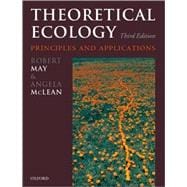
Note: Supplemental materials are not guaranteed with Rental or Used book purchases.
Purchase Benefits
What is included with this book?
| Acknowledgements | p. vii |
| Contributors | p. ix |
| Introduction | p. 1 |
| How populations cohere: five rules for cooperation | p. 7 |
| Single-species dynamics | p. 17 |
| Metapopulations and their spatial dynamics | p. 35 |
| Predator-prey interactions | p. 46 |
| Plant population dynamics | p. 62 |
| Interspecific competition and multispecies coexistence | p. 84 |
| Diversity and stability in ecological communities | p. 98 |
| Communities: patterns | p. 111 |
| Dynamics of infectious disease | p. 132 |
| Fisheries | p. 148 |
| A doubly Green Revolution: ecology and food production | p. 158 |
| Conservation biology: unsolved problems and their policy implications | p. 172 |
| Climate change and conservation biology | p. 190 |
| Unanswered questions and why they matter | p. 205 |
| References | p. 216 |
| Index | p. 249 |
| Table of Contents provided by Ingram. All Rights Reserved. |
The New copy of this book will include any supplemental materials advertised. Please check the title of the book to determine if it should include any access cards, study guides, lab manuals, CDs, etc.
The Used, Rental and eBook copies of this book are not guaranteed to include any supplemental materials. Typically, only the book itself is included. This is true even if the title states it includes any access cards, study guides, lab manuals, CDs, etc.